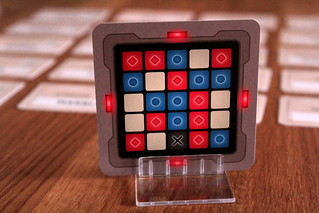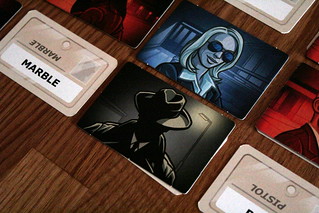| Strategy | Luck |
|---|---|
| Interaction | Components & Design |
| Complexity | Score |
Besides being a word game, Codenames is a secret agent game. You play it in two teams, sitting around a shared grid of 25 word cards drawn from a huge selection. The words are your secret agents’ code names, your goal is to make contact with all of your agents before the other team can contact all theirs. Each team has one spymaster and pretty much any number of field operatives. The two spymasters know who all the secret agents are working for and have to convey that information to their field operatives so they can contact the agents. But just writing them a list of names wouldn’t be the secret agent way of doing things. The spymasters may only communicate with their team in a very, very cryptic way.

The teams take turns, and the spymaster of the active team gives his operatives a hint of one word that relates to as many of their agents’ code names as possible, and the number of cards that hint relates to. The one word restriction is actually a bit more loose, you can always use a proper name, a movie title or something like that, even if it’s more than one word. But even then, after that one hint, the spymaster shuts up and his team has to figure out who their agents are. As an example, the spymaster might see that his team has the agents “Sun” and “Star” working for them and may give the hint “Space, two”. He only gets one hint per round, so the hint should relate to as many cards as possible. But even more important is that the hints do not relate to any cards that are not an agent for the team, because the consequences of contacting the wrong agent can be dire indeed.
Lets assume that, in the Space example above, the “Moon” card was also on the table and your agents pick that one first. You can’t really blame them, can you? Agent Moon might not be an agent at all but just a plain, old civilian. Contacting him instead of one of your agents immediately ends your team’s turn, but that’s it. Losing a turn like that might cost you the game, but it’s not necessarily a disaster. But Agent Moon could also be an enemy agent. In that case, your turn still ends immediately and you also revealed an agent for your enemies, one that they won’t have to figure out themselves any more. That’s worse. But it’s still not the worst that can happen. One of the cards on the grid is an assassin, a violent and unpleasant person that really only wants to be left alone. Accidentally contacting the assassin is really, really bad because he makes your team lose immediately. Spymasters should take great care to avoid hints that could relate to the assassin. Don’t let your team get close to him.

Doing well in Codenames really depends on how well the spymaster vibes with his agents. You win this game with hints that relate to three, four of five cards, but there’s rarely a straightforward way to do that. So you end up with hints like “Jean Grey” because it fits “Superhero”, “Phoenix” and “Force” – and then you find out none of your teammates knows the X-Men. Oops. And that’s not the worst of it yet. Sometimes you get lucky and can give a perfectly simple hint like “Hot” for “Sun”, “Star” and “Fire” and then you sit and watch in horror as your agents agree that nurses are pretty hot. “Nurse” was the assassin. Thanks guys. You know I love you, although it didn’t sound like it right then.
Codenames is a huge amount of fun when you play it with the right people. They have to enjoy this style of association games in the first place, and they have to enjoy the hidden push your luck mechanic the game has. I mean, of course you can win by giving hints that match one or two cards, but to have fun you try and push yourself and go for four cards with one hint, with the risk that your team won’t get any of them. I have yet to manage a useful hint for five cards, but I have heard tales of it. So Codenames is not a game for everyone, but as usual for Vlaada it is an excellent entry in its genre. The one complaint that some of our test players had was not about the game mechanics at all. They found it disorienting that the word cards are rectangular but the marks on the spymasters’ cards are square, so they sometimes slipped into the wrong column. When that is the biggest complaint you have about a game, then there’s really nothing wrong with it.








